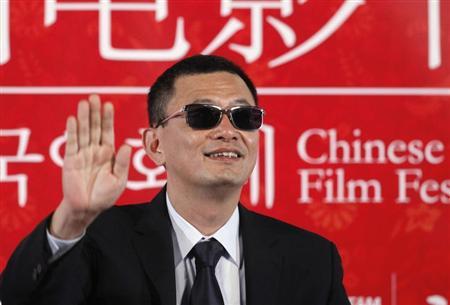

 |
|
Director Wong Kar-wai waves during a news conference to promote his movie "The Grandmaster", the opening film of the Chinese Film Festival, in Seoul June 16, 2013.[Photo/Agencies] |
Hong Kong director Wong Kar Wai, best known for pensive dramas "Chungking Express" and "In the Mood for Love," explores the life of Kung Fu master Ip Man in the new film "The Grandmaster," which will be released on August 23 in the United States.
The film tells the story of Ip - the trainer of kungfu film icon Bruce Lee - played by longtime Wong actor Tony Leung. It is divided into three parts that span his adulthood in 1930s' southern China and his Hong Kong exile in 1949.
Wong, 57, spoke with Reuters about the meaning of kungfu, exile and writing a fictional love story into Ip's life in the form of Gong Er, the daughter of a kungfu grandmaster and played by Chinese actress Zhang Ziyi.
Q: What motivated you to make a film about Ip Man?
A: To make a kungfu film in my way. I see today there's a lot (of) misconceptions or misinterpretations about some of these Chinese things, and one of them is the Chinese martial arts. The reason I wanted to make a film about Ip Man is because I believe a lot of people follow Chinese kungfu or kungfu films because of Bruce Lee.
Q: How well-known is Ip Man, who died at age 79 in 1972, in Hong Kong today?
A: He's not that popular, but he's very respected in the martial arts world, and in the case of Bruce Lee, he has become a legend. Once I knew I wanted to make a film about him, I had a meeting with both of his sons, and they showed me this short film shot three days before he passed away. ... He was doing demonstrations (in the film) of the Wing Chun (a kungfu style) combinations. He was 70-something (years old), very skinny, very weak, and he's doing this demonstration with a dummy in the living room.
Q: What did you make of that film?
A: It's very intriguing why he wanted to do this, because we all know that this combination is very, very legendary. It's the core technique of the Wing Chun combat skill. We watched this film - now you can find it on YouTube - but at that time, it was almost like a secret. What I think he intended to do is to do this: he wanted to preserve his technique so it can be shared and taught to future generations.
Q: How is your film different from other kungfu films?
A: I haven't seen any films talking about legacy. I've never seen a film that is so honest to the value of Chinese martial arts. I haven't seen many films that are serious about the technique. ... Everyone says Wing Chun is very good with the hands, but they don't know that actually the secret is in the footwork.